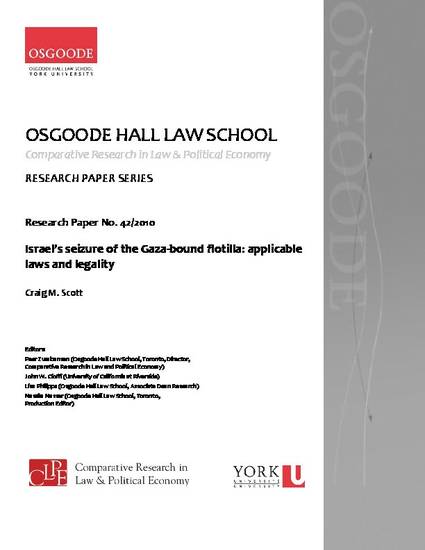
- Arms interdiction,
- Blockade,
- Enforcement jurisdiction,
- Gaza,
- High seas,
- International commissions,
- International human rights law,
- International humanitarian law,
- Israel,
- Law of the sea,
- Laws of war,
- Naval blockade,
- right of visit,
- Security Council,
- Self-defence,
- Self-defense,
- Use of force,
- Warfare
The present working paper analyzes the applicable laws and legality of Israel’s naval blockade on Gaza and of the enforcement of that blockade through the seizure of a number of vessels, notably the Mavi Marmara, on May 31, 2010. It includes a comparison between that analysis and the analysis of the just-released (September 27, 2010) Report of the international fact-finding mission to investigate violations of international law, including international humanitarian and human rights law, resulting from the Israeli attacks on the flotilla of ships carrying humanitarian assistance. This three-member mission was chaired by Judge Karl T. Hudson-Phillips, Q.C., retired Judge of the International Criminal Court and former Attorney General of Trinidad and Tobago. Its mission was established by the UN Human Rights Council in resolution 14/1 of 2 June 2010. Suggestions are made about questions of law to which two remaining panels or commissions of inquiry may wish to give special attention. One such question is whether or not a belligerent right of visit of vessels for purposes of arms interdiction requires a naval blockade first to be in place. A second question meriting further attention is how to think about the interaction of personal rights of self-defence of both the passengers aboard the ships and the soldiers ordered to seize the ships, in terms of the analysis of the necessity and proportionality of specific actions taken by Israeli soldiers. A third question is whether, without addressing the matter in any detail, the Hudson-Phillips report unhelpfully blurred the jus in bello right of visit within the laws of war and the jus ad bellum right of states to self-defence. The first of these two other commissions is the four-member Panel of Inquiry established by UN Secretary-General Ban Ki-moon, with the support of the UN Security Council, that panel is chaired by the former Prime Minister of New Zealand, Geoffrey Palmer, and vice-chaired by the former President of Colombia, Alvaro Uribe, and also includes panel members from Israel and Turkey. The second is Israel’s own “Public Commission to Examine the Maritime Incident of 31 May 2010” chaired by retired Israeli Supreme Court justice, Judge Jacob Terkul, and including as non-voting observers Northern Ireland’s former First Minister, Lord William David Trimble, and a former Judge Advocate General for Canada, Brigadier General (retired) Ken Watkin.
Available at: http://works.bepress.com/craig_scott/34/
